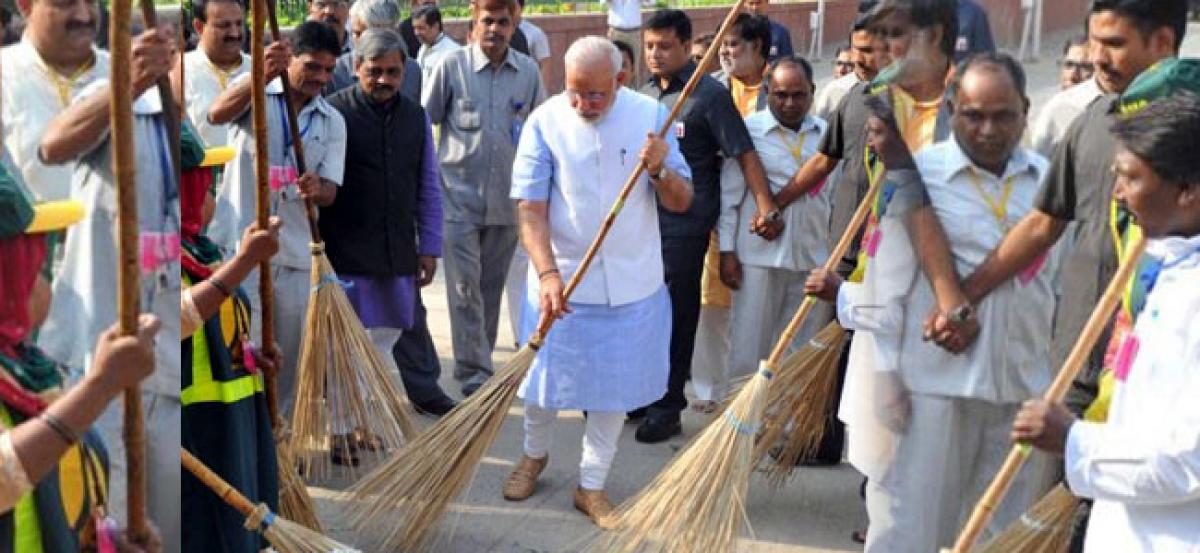Live
- Exams will not be cancelled: BPSC chairman
- Nagesh Trophy: Karnataka, T.N win in Group A; Bihar, Rajasthan triumph in Group B
- Economic and digital corridors to maritime connectivity, India and Italy building vision for future, says Italian Ambassador
- SMAT 2024: Patidar's heroics guide Madhya Pradesh to final after 13 years
- CCPA issues notices to 17 entities for violating direct selling rules
- Mamata expresses satisfaction over speedy conviction in minor girl rape-murder case
- Transparent Survey Process for Indiramma Housing Scheme Directed by District Collector
- District SP T Srinivas Rao, IPS, Conducts Annual Inspection at Dharur Police Station
- Job Fair for Pharmacy Retail Store Opportunities in Dharur and Hyderabad
- Focus on Employment, Not Liquor Shops: Ramachandra Reddy Demands Youth Empowerment in Telangana
Just In

The Central Government on Friday deplored the insensitivity towards Mahatma Gandhi shown by Leo Heller, the United Nations Special Rapporteur (UNSR) on human rights to safe drinking water and sanitation.
New Delhi : The Central Government on Friday deplored the insensitivity towards Mahatma Gandhi shown by Leo Heller, the United Nations Special Rapporteur (UNSR) on human rights to safe drinking water and sanitation.
The UNSR on human rights to safe drinking water and sanitation undertook a visit to India from October 27 to November 10, 2017.
"While the UNSR appears to compliment India's efforts in recent years in addressing gaps in water and sanitation services through an 'unprecedented commitment', he goes on to make sweeping judgements which are either factually incorrect, based on incomplete information, or grossly misrepresent the drinking water and sanitation situation on the ground," a release by the Centre stated on Friday.
"Admitting that 'two weeks is not sufficient to fully understand all aspects of the situation of human rights to water and sanitation in a country as big, diverse and complex in India', he still goes ahead to make the unsubstantiated allegation that human rights principles have not been properly addressed in India's water and sanitation programmes," the release added.
"The world knows that the Mahatma was the foremost proponent of human rights, including for sanitation, his unique and special focus. Gandhiji's glasses, the unique logo of the Swachh Bharat Mission, epitomise core human rights principles," the release said, in response to a press release by the UNSR.
"Now is a critical time to replace the lens of those glasses (Gandhi's glasses) with the human rights lens," the UNSR had said.
The Central Government in a statement strongly rejected Heller's reports calling them "baseless assertions."
The Centre asserted that the Swachh Bharat Mission and the rural and urban drinking water programmes fully conformed to the Human Rights criteria and principles as established by the UN system.
Few pointers stated by the Central Government are listed below:
Availability
• Over 25 crore people have got sanitation facilities in three years. Over 2.7 lakh villages, 227 ODF districts and 6 ODF states are open defecation free (ODF)
• 77% of the habitations in rural areas have access to at least 40 Litres Per Capita per Day (LPCD) of water supply. More than 90% people in urban areas have access to safe drinking water
Quality
• SBM promotes safe toilet designs. States have flexibility to establish relevant quality standards
• GoI's national sub-mission to end arsenic and fluoride contamination in rural water in 4 years
Acceptability
• Separate toilets for men and women at all institutions
Accessibility
• Over 5.3 crore Individual Household Latrines have been constructed in three years alone
• The National Rural Drinking Water Programme (NRDWP) provides for drinking water within the household premises or at a distance of not more than 100 metres from their household
Affordability
• SBM provides a toilet incentive of Rs 12,000 in rural areas and Rs 4,000 in urban areas
• Water is available for free or very nominal rates to the rural population
"Referring to the incomplete understanding of water and sanitation in India, the UNSR has failed to acknowledge the paradigm shift in national sanitation policy which has moved from construction of toilets to open defecation free communities and seems to be looking at the SBM from a tinted lens," the government added.
It further asserted that Heller, also attempted to question the findings of a third party, 1,40,000 household national survey by the Quality Council of India that usage of toilets was above 91 per cent, by "misleadingly comparing" it with a survey of only 1024 households by Water Aid which focused on toilet technology and not on usage.
"The government has the highest commitment to human rights in general and particularly in the water supply and sanitation sectors and strongly rejects the claims in the UNSR's report and press statements," the statement concluded.

© 2024 Hyderabad Media House Limited/The Hans India. All rights reserved. Powered by hocalwire.com







